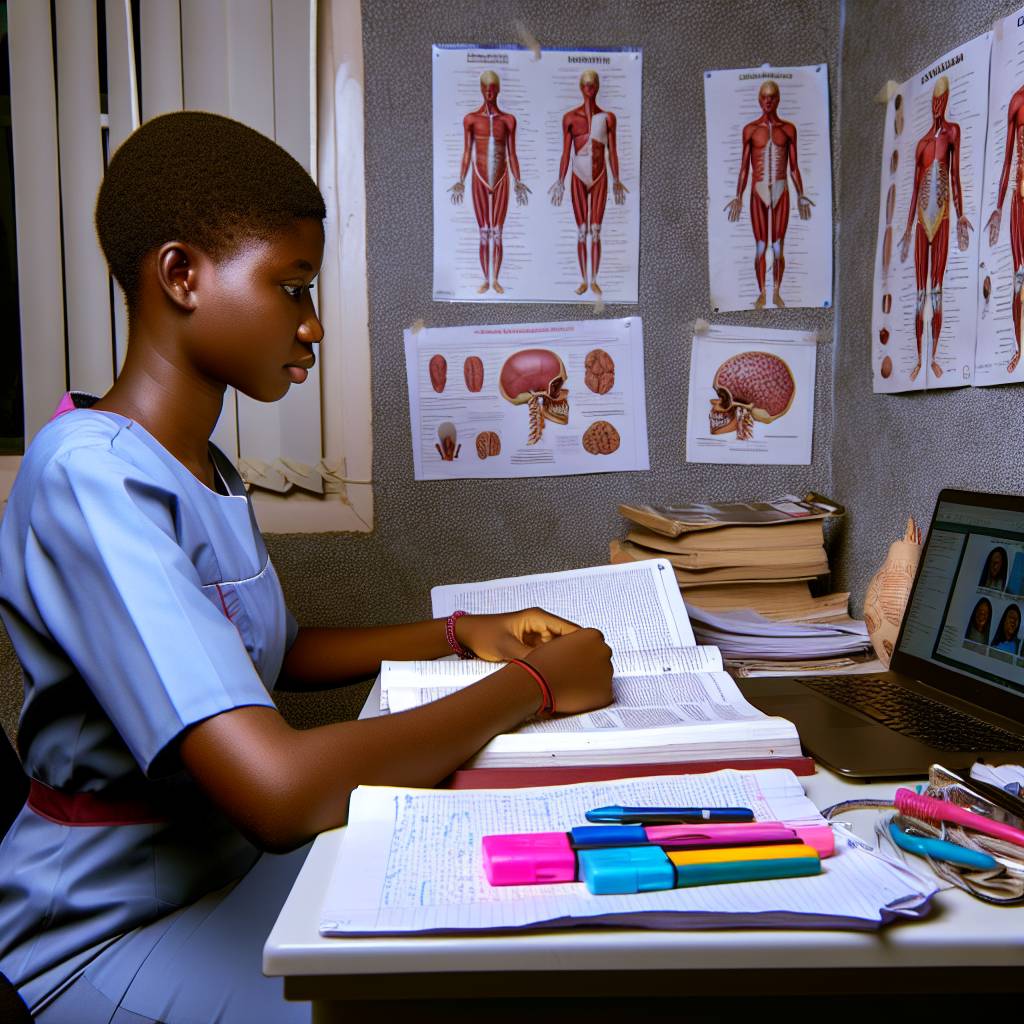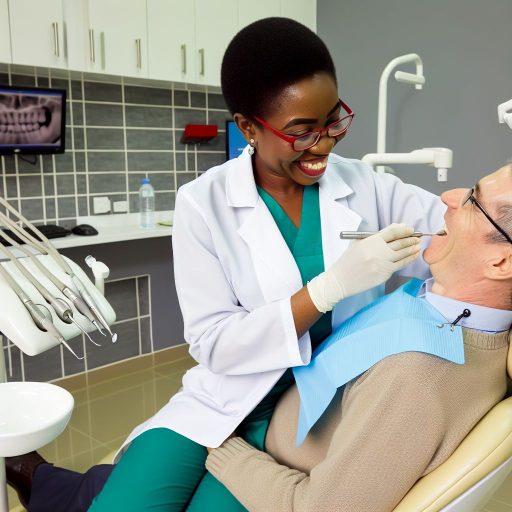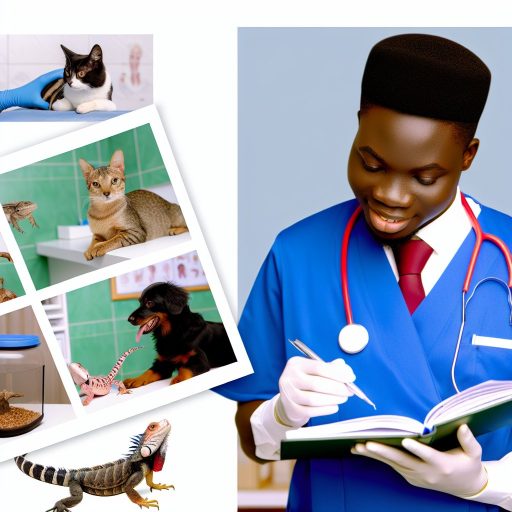Introduction:
Nigerian medical students often face challenges such as high academic demands, limited resources, and intense competition.
Effective study techniques are crucial for their success in this demanding field.
Without effective study strategies, medical students may struggle to retain vast amounts of information.
This can lead to poor academic performance and potential burnout.
Implementing the right study techniques can help students optimize their learning.
Moreover, it can improve their overall academic performance.
In this blog post, we will explore some effective study techniques.
Nigerian medical students can utilize these techniques to enhance their learning experience.
Ultimately, this will help them achieve success in their academic pursuits.
Time Management
Effective time management is crucial for Nigerian medical students to excel in their studies.
By creating a study schedule, setting realistic goals, and avoiding procrastination, students can optimize their study time and achieve academic success.
Importance of Creating a Study Schedule
- Organizes study sessions efficiently
- Helps prioritize tasks and topics
- Ensures adequate time for each subject
- Reduces last-minute cramming
Setting Realistic Goals and Deadlines for Studying
- Break down long-term goals into smaller tasks
- Assign deadlines to each task
- Monitor progress regularly
- Celebrate achievements to stay motivated
Avoiding Procrastination through Proper Time Management Techniques
- Identify time-wasting activities and eliminate them
- Use tools like timers or apps to stay focused
- Take short breaks between study sessions
- Reward yourself for completing tasks on schedule
By implementing these time management strategies, Nigerian medical students can create a balanced study routine that maximizes productivity and minimizes stress.
Consistent practice of these techniques will lead to improved academic performance and overall well-being.
Active learning strategies:
Active learning is essential for Nigerian medical students to excel in their studies.
By actively engaging in various strategies, students can enhance their understanding and retain information more effectively.
Engaging in discussions with classmates:
Collaborating with peers allows students to share knowledge, clarify doubts, and gain different perspectives on complex topics.
By discussing challenging concepts with classmates, students can reinforce their understanding and improve their retention of information.
Utilizing flashcards and mnemonics:
Flashcards are a popular tool used by many medical students to memorize and recall information efficiently.
By creating flashcards with key facts, terms, and diagrams, students can review and test themselves on important content.
Mnemonics, on the other hand, are memory aids such as acronyms or rhymes that help students remember complex information more easily.
Teaching concepts to others:
Teaching concepts to others is a powerful method for reinforcing understanding and solidifying knowledge.
By explaining difficult topics to classmates or family members, students are forced to articulate their understanding, identify gaps in their knowledge, and strengthen their grasp of the material.
This approach not only benefits the student teaching but also helps the listener learn the material more effectively.
Incorporating active learning strategies into their study routine can significantly enhance Nigerian medical students’ academic performance and overall learning experience.
By engaging in discussions, utilizing flashcards and mnemonics, and teaching concepts to others, students can improve their comprehension, retention, and application of medical knowledge.
Uncover the Details: Latest Research in Restorative Dental Practices
Effective note-taking
Taking effective notes is a crucial aspect of studying for Nigerian medical students.
By following these strategies, students can enhance their learning and retention of important information.
- Utilizing outlines and diagrams to organize information.
- Reviewing and summarizing notes after lectures.
- Using technology tools for note-taking such as apps or software.
Utilizing outlines and diagrams to organize information can help students make sense of complex medical concepts.
By breaking down information into smaller, digestible chunks, students can better understand the material and retain it more effectively.
After attending lectures, it is important for students to review and summarize their notes.
This process can help reinforce the information learned in class and identify any areas that may require further clarification.
By regularly reviewing notes, students can solidify their understanding of key concepts.
In today’s digital age, technology tools can also be utilized for note-taking.
There are various apps and software available that can help students organize their notes, create flashcards, and even collaborate with peers.
By making use of these tools, students can streamline their study process and access their notes anytime, anywhere.
Effective note-taking is a fundamental study technique for Nigerian medical students.
By implementing these strategies, students can improve their study habits, enhance their understanding of medical concepts, and ultimately excel in their academic pursuits.
You Might Also Like: Advancements in Oral Surgery Techniques in Nigeria
Utilizing Resources
Medical school can be demanding.
Transform Your Career with Expert Guidance
Get personalized mentorship consulting that’s tailored to your unique path. Our expert advice is actionable and exclusive.
Get StartedAs a Nigerian medical student, it is crucial to utilize all available resources to succeed in your studies.
Here are some effective study techniques that can help you make the most of the resources available to you:
Taking Advantage of Library Resources and Online Databases
One of the best ways to enhance your medical studies is by utilizing the resources available in your school’s library and online databases.
These resources can provide you with access to a wide range of medical textbooks, journals, research articles, and other study materials.
When using the library, make sure to familiarize yourself with the catalog and the various sections where medical books are located.
Take advantage of quiet study areas in the library where you can concentrate and focus on your studies without distractions.
If your school provides online access to databases such as PubMed, UpToDate, or Cochrane Library, be sure to make use of them.
These platforms give access to the latest research and information in the field of medicine.
Attending Review Sessions and Tutorials Offered by the School
Many medical schools in Nigeria offer review sessions and tutorials to help students reinforce their understanding of complex concepts.
These sessions usually conduct by experienced faculty members or senior students.
They can provide valuable insights and guidance to help you succeed in your studies.
Make it a point to attend these review sessions and tutorials regularly.
These can give you the opportunity to ask questions, clarify doubts, and engage in discussions with your peers.
This interactive learning experience can help you solidify your knowledge and improve your performance in exams.
Seeking Help from Professors and Mentors When Needed
Don’t hesitate to reach out to your professors and mentors whenever you encounter difficulties or need additional support in your studies.
These academic experts are there to help you succeed.
They can provide valuable guidance, feedback, and resources to assist you in your academic journey.
Whether you need clarification on a complex topic or advice on your career path, your professors and mentors are there to support you.
Make use of their office hours or schedule a one-on-one meeting to discuss your concerns.
Remember that seeking help is a sign of strength, not weakness.
It can make a significant difference in your academic success.
By utilizing resources such as library materials, online databases, review sessions, tutorials, and seeking help from professors and mentors, Nigerian medical students can enhance their learning experience.
They can deepen their understanding of the subject matter and excel in their studies.
Success in medical school is not just about studying hard.
It is also about studying smart and making the most of the resources available to you.
Find Out More: Radiography Internship Programs in Nigeria
Healthy Study Environment:
- Creating a designated study space free from distractions.
- Ensuring proper lighting and ventilation in the study area.
- Taking breaks and staying hydrated during study sessions.
Creating a healthy study environment is crucial for Nigerian medical students to maximize their study efficiency and focus.
Here are some effective techniques to establish a conducive study space:
Designated Study Space:
It is essential to have a designated study space that is solely dedicated to studying.
This area should be free from distractions such as noise, clutter, or other disruptions.
By having a specific location for studying, it helps signal to your brain that it is time to focus and concentrate.
Proper Lighting and Ventilation:
Ensure that your study area has adequate lighting to prevent eyestrain and fatigue.
Natural light is ideal, but if that is not possible, use a good desk lamp.
Additionally, proper ventilation is essential to keep the air fresh and oxygenated.
This helps you stay alert and focused during long study sessions.
Taking Breaks:
While studying for long hours is necessary, it is equally important to take regular breaks to avoid burnout.
Implement the Pomodoro Technique, which involves studying for 25 minutes and then taking a 5-minute break.
This method helps maintain focus and productivity throughout your study sessions.
Staying Hydrated:
Dehydration can negatively impact cognitive function and concentration levels.
Keep a water bottle nearby and ensure you stay hydrated during study sessions.
Drinking water not only keeps you physically healthy but also aids in mental alertness and overall academic performance.
By implementing these healthy study environment techniques, Nigerian medical students can create an optimal setting for effective studying.
Remember, a conducive study space plays a significant role in enhancing productivity, focus, and retaining information.
Prioritize your study environment to achieve academic success.
Delve into the Subject: Medical Microbiology Curriculum in Nigeria

Practice and repetition:
- Engaging in regular practice questions and mock exams.
- Revisiting challenging topics to reinforce understanding.
- Testing oneself regularly to track progress.
Practicing and repetition are essential study techniques for Nigerian medical students.
Consistent practice helps to reinforce learning and improve retention of information.
Here are some tips on how to effectively incorporate practice and repetition into your study routine.
Engaging in regular practice questions and mock exams:
One of the most effective ways to reinforce your understanding of medical concepts is by answering practice questions and taking mock exams.
This helps you apply what you have learned in a practical context and identify areas where you need to improve.
Make use of resources like textbooks, online question banks, and past exam papers to access a variety of practice questions.
Set aside time each day to work through these questions and simulate exam conditions as closely as possible.
This will help you build confidence and test your knowledge under pressure.
Revisiting challenging topics to reinforce understanding:
It’s common for medical students to encounter challenging topics that are difficult to grasp initially.
Instead of avoiding these topics, make an effort to revisit them regularly to reinforce your understanding.
Break down complex concepts into smaller, manageable parts and tackle them one at a time.
Use mnemonic devices, diagrams, and other visual aids to aid your memory and make connections between different concepts.
Seeking help from peers, tutors, or online resources can also provide you with additional insights and explanations.
Testing oneself regularly to track progress:
Self-assessment is a crucial part of the learning process for medical students.
By testing yourself regularly, you can track your progress, identify areas of weakness, and adjust your study strategies accordingly.
Set aside time each week to take mini quizzes or create flashcards for quick review.
This will help you gauge your understanding of key concepts and determine which topics require more focus.
Additionally, consider forming study groups with your peers to engage in group discussions and peer-to-peer teaching, which can deepen your understanding of difficult topics.
Mindfulness and self-care:
- Practicing mindfulness techniques to reduce stress and anxiety.
- Getting enough sleep and maintaining a healthy diet.
- Engaging in physical activity to improve focus and concentration.
Practicing mindfulness techniques:
Medical school can be incredibly stressful, with demanding coursework and long hours of studying.
To combat this stress, it’s essential for Nigerian medical students to incorporate mindfulness techniques into their daily routine.
Mindfulness involves staying present in the moment and focusing on one’s thoughts and feelings without judgment.
This practice can help reduce anxiety and improve overall mental well-being.
Getting enough sleep and maintaining a healthy diet:
Sleep is crucial for cognitive function and memory consolidation, making it essential for medical students to get an adequate amount each night.
Additionally, maintaining a healthy diet provides the necessary nutrients to fuel the brain and body for long study sessions.
By prioritizing sleep and nutrition, Nigerian medical students can optimize their learning potential and overall health.
Engaging in physical activity:
Exercise is not only beneficial for physical health but also plays a significant role in mental well-being.
Regular physical activity can help reduce stress, improve focus, and boost concentration levels.
Nigerian medical students should incorporate exercise into their weekly routine to reap the cognitive benefits that come with an active lifestyle.
Whether it’s going for a run, practicing yoga, or playing a sport, finding ways to stay active can enhance academic performance and overall wellness.
Continuous self-assessment:
- Reflecting on study habits and making necessary adjustments.
- Seeking feedback from professors and peers to identify areas for improvement.
- Setting aside time for self-assessment and self-reflection regularly.
Self-assessment is a critical component of effective study techniques for Nigerian medical students.
It involves reflecting on your study habits, seeking feedback from others, and setting aside time for regular self-assessment.
Reflecting on study habits and making necessary adjustments
One of the first steps in continuous self-assessment is to reflect on your study habits.
Take some time to evaluate how you study, how effective your methods are, and what areas you may need to improve.
Are you a visual learner? Do you retain information better through auditory means?
Understanding your learning style can help you tailor your study techniques accordingly.
Once you have identified areas for improvement, it’s important to make necessary adjustments.
This could involve changing your study environment, trying out different study techniques, or seeking help from professors or peers.
Don’t be afraid to experiment with new strategies to find what works best for you.
Seeking feedback from professors and peers to identify areas for improvement
Feedback is a valuable tool for self-assessment.
It provides you with an outside perspective on your study habits and can help you identify areas for improvement.
Don’t hesitate to reach out to professors or peers for feedback on your performance in class, your understanding of course material, or your study techniques.
Professors can offer valuable insight into what you’re doing well and where you may need to focus more attention.
Peers can also provide helpful feedback, as they may have different perspectives on your study habits and techniques.
Use their feedback to make informed decisions about how to adjust your study routine.
Setting aside time for self-assessment and self-reflection regularly
Regular self-assessment is key to improving your study habits and techniques.
Make it a priority to set aside time for self-reflection on a consistent basis.
This could be a weekly or monthly check-in where you evaluate your progress, identify any challenges or areas for improvement, and make a plan for how to address them.
During your self-assessment sessions, take the time to reflect on what has been working well for you and what hasn’t.
Consider what study techniques have been most effective, what areas you may need to focus on more, and what adjustments you can make to improve your overall performance.
Use this time to set goals for yourself and create a roadmap for achieving them.
Continuous self-assessment is a crucial aspect of effective study techniques for Nigerian medical students.
By reflecting on your study habits, seeking feedback from others, and setting aside time for regular self-assessment, you can improve your study skills, enhance your understanding of course material, and ultimately succeed in your medical education.
Effective Study Techniques for Medical Students
Effective study techniques are crucial for Nigerian medical students to excel in their academic journey.
By implementing these strategies, students can improve their learning outcomes and performance in medical studies.
Benefits of Effective Study Techniques:
-
Improved Retention: Active studying promotes better memory recall.
-
Time Management: Organized study methods help allocate time efficiently.
-
Reduced Stress: Effective study habits reduce anxiety levels.
Implementing Effective Study Techniques:
-
Create a Study Schedule: Allocate specific time slots for each subject.
-
Use Visual Aids: Utilize diagrams, charts, and flashcards.
-
Practice Active Learning: Engage in discussions and group study.
Enhancing Learning Outcomes
Implementing effective study techniques is essential for students to achieve academic success.
By integrating these strategies into their daily routine, students can enhance their learning experience.
Ultimately, this can lead to improved performance in their medical studies.
Encouragement is given to students to prioritize these techniques in their study habits.
Unlock your full potential and excel in your medical education journey.
Additional Resources
Building a research culture among nigerian medical students: the …
Assessing medical students’ perception of effective teaching and …




